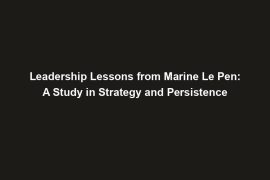Hey there, history buffs! Today we’re diving into the fascinating world of Louis-Philippe, the last King of France. Known for his controversial reign, Louis-Philippe left a lasting impact on French history with his unique leadership style. Despite the mixed reviews, there are actually some valuable lessons we can learn from this intriguing monarch.
Louis-Philippe was a master at adapting to the ever-changing political landscape of early 19th century France. He knew how to pivot his leadership style to meet the needs of the people, navigating turbulent times with finesse. His ability to communicate effectively was another key strength, as he was skilled at articulating his vision and forming alliances with different political factions.
But perhaps one of the most admirable qualities of Louis-Philippe was his empathy. He had a knack for connecting with the common folk, which helped him maintain popular support and stability during his reign. By understanding the needs and concerns of the people, he was able to navigate through challenging situations with grace.
So, despite the controversies surrounding Louis-Philippe’s rule, there’s no denying that there are valuable leadership lessons to be learned from his time as King of France. Join me as we explore these lessons in more detail and discover how they can be applied to modern leadership challenges. Let’s uncover the enduring legacy of Louis-Philippe and the insights he offers to those in positions of power today.
Adaptability: Navigating Turbulent Waters
One of the key leadership lessons we can learn from Louis-Philippe is adaptability. Imagine being the ruler of a country that had just gone through multiple revolutions and was constantly on the brink of political upheaval. Louis-Philippe faced this daunting challenge head-on by adjusting his leadership style to suit the changing needs of the people.
Like a skilled sailor changing course to avoid stormy seas, Louis-Philippe navigated the turbulent political landscape of early 19th century France by being flexible and open to new ideas. He understood that in order to survive and thrive as a leader, he needed to be willing to change his approach when circumstances demanded it.
Communication: Mastering the Art of Persuasion
Another important leadership lesson we can draw from Louis-Philippe is the power of effective communication. Just as a master painter uses different brushes to create a masterpiece, Louis-Philippe skillfully utilized the art of persuasion to communicate his vision and build alliances with various political factions.
He was a charismatic leader who knew how to inspire and motivate others through his words and actions. By effectively communicating his ideas and building strong relationships with key stakeholders, Louis-Philippe was able to garner support and maintain stability during his reign.
Empathy: Connecting with the Common People
Lastly, Louis-Philippe’s ability to connect with the common people is a valuable lesson in leadership. In a time when monarchs were often seen as distant and out of touch with the concerns of their subjects, Louis-Philippe stood out for his genuine empathy and compassion.
He took the time to listen to the grievances of the people and genuinely cared about their well-being. This empathy allowed him to maintain popular support and ensure stability during a time of great uncertainty in France.
Overall, Louis-Philippe’s reign may have been controversial, but there are undeniable leadership lessons that we can glean from his experiences. By being adaptable, mastering the art of communication, and connecting with the common people, we can all strive to be better leaders in our own lives and careers.
Conclusion
As we wrap up our exploration of the leadership lessons we can learn from Louis-Philippe, it’s clear that his reign, though controversial, offers valuable insights that are still relevant today. Let’s reflect on the key takeaways from his leadership style and how they can be applied to modern challenges.
Recap of the leadership lessons learned
First and foremost, Louis-Philippe’s adaptability stands out as a crucial skill for any leader. He was able to pivot and adjust his approach in response to the ever-changing political landscape, ensuring his survival in a tumultuous era. This flexibility is essential in today’s fast-paced world where leaders must be able to navigate uncertainty and change.
Communication was another area where Louis-Philippe excelled. His ability to effectively convey his vision and build alliances with various factions allowed him to maintain stability and support throughout his reign. In a time where effective communication is more important than ever, this skill remains a cornerstone of successful leadership.
Lastly, Louis-Philippe’s empathy towards the common people played a significant role in his popularity and longevity as a ruler. By connecting with the concerns and needs of the populace, he was able to build a strong foundation of support that sustained him through challenging times. This emphasis on understanding and relating to others is a timeless lesson for leaders seeking to build trust and loyalty.
Reflection on application to modern leadership challenges
Looking at the leadership lessons of Louis-Philippe in the context of today’s world, we can see how they continue to hold value. In a rapidly changing and interconnected society, adaptability, communication, and empathy are more important than ever for leaders striving to make a positive impact.
Leaders who can embrace change, communicate effectively, and show empathy towards others will be better equipped to navigate the complexities of our modern landscape. By learning from historical figures like Louis-Philippe, we can gain insights that inform our own leadership journeys and help us make a difference in our communities.
Final thoughts
As we conclude our discussion on Louis-Philippe and the leadership lessons he offers, it’s worth pausing to appreciate the enduring legacy of this complex figure. While his reign may have been marked by controversy, his contributions to the study of leadership are undeniable.
By studying the past and drawing inspiration from figures like Louis-Philippe, we can continue to grow and evolve as leaders, bringing fresh perspectives and approaches to the challenges we face. Let’s keep his lessons in mind as we navigate our own leadership paths, striving to make a positive impact on those around us.
Thank you for joining me on this journey through history and leadership. I hope you found it as insightful and inspiring as I have!



